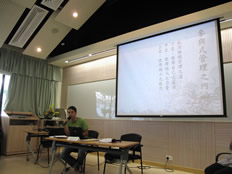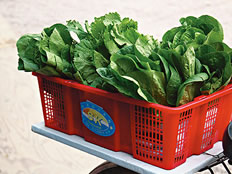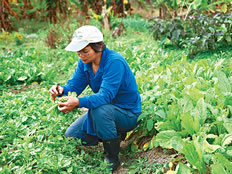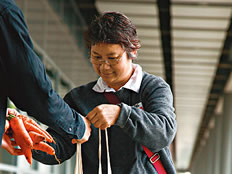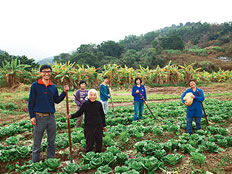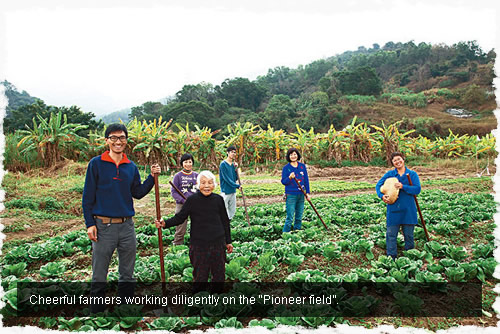 Every day an ordinary bicycle goes to and fro in the area of Pak Heung in Yuen Long, Hong Kong. At the back of the bicycle is a basket of fresh organic vegetables. They are to be delivered to consumers in Pak Heung. However, what the bicycle carries is more than the organic vegetables of a CSA project. It is a revolution, a call to preserve farmland through the consumption of local vegetables by local people.
Every day an ordinary bicycle goes to and fro in the area of Pak Heung in Yuen Long, Hong Kong. At the back of the bicycle is a basket of fresh organic vegetables. They are to be delivered to consumers in Pak Heung. However, what the bicycle carries is more than the organic vegetables of a CSA project. It is a revolution, a call to preserve farmland through the consumption of local vegetables by local people.
Last year Pak Heung Green Club of the Land Justice League, an organisation advocating the preservation of Hong Kong's farmland, launched a project, "Pak Heung People Eat Pat Heung Vegetables" to provide residents of Pak Heung, in Yuen Long in the New Territories, with fresh organic vegetables grown by farmers in Pak Heung itself. The aim was to practise a mode of production and consumption in the spirit of localism, involving local cultivation, local transportation and local consumption. This form of "localism" has become popular in Taiwan and Japan, but it is a rare practice in Hong Kong which depends mainly on imported food for its everyday consumption.
Thus the Land Justice League was going against the trend when it launched the project. They have 3 objectives: first, to support organic farms in the area of Pak Heung; second, to strengthen the mutually beneficial relationship between local residents and local farms; and third, to encourage local residents to become concerned with agriculture so as to consolidate the forces to preserve and to revive local farmland. The third objective is the ultimate vision and goal of the project. The people who masterminded the project hope to start in a small area and gather strength by building a group of consumers who support the preservation of farmland. In the long run, they hope to quietly bring about a revolution to preserve farmland.
Chu Hoi-dick, an officer of the Land Justice League and one of the organisers of the project, described to the media the alienation Hong Kong urban consumers feel towards farmland and farmers in the New Territories. Urban consumers may support and buy organic vegetables cultivated in the New Territories. They may even know which farm the vegetables come from, but they are not actively concerned with the farmland on which the vegetables are grown or with asking questions such as whether the tenancy of the land will soon come to an end or whether the land will one day be sold to developers to build flats. "Other than those who fight against it, every time a piece of farmland is destroyed, it is treated as just another piece of news by urban dwellers. They don't think it concerns them."
However, if the farm is in one's neighbourhood, and produces vegetables that are supplied daily to the residents in the neighbourhood, the scenario will be different. If their own food supply is threatened, the residents will be more motivated to stop the excavators. "When human beings and farmland become closer, the former can no longer be completely indifferent towards the life and death of the farmland."
"Pak Heung People Eat Pak Heung Vegetables" was launched in September 2011 on a vegetable field known as the "pioneer field". Pak Heung Green Club, previously known as Pak Heung and Kam Tin Working Team, and villagers of the new Choi Yuen Village took part in farming and liaising with Pak Heung residents. Some promotion was also carried out in the area. Between the end of 2011 and the beginning of 2012, a large amount of choy-sum (Chinese flowering cabbage), radishes and romaine lettuce were grown and harvested. To promote sales, Pak Heung Green Club set up a Facebook page to promote their products, and the effect was quite good. Sometimes, a few dozen catties of vegetables were sold each day. However, of the customers who learnt about their efforts mostly through Facebook and the mainstream media, most were not local residents.
Since March 2012, Pak Heung Green Club has been publishing the The Local Paper of Pak Heung and Kam Tin, and one column in the paper is on farms in the area. The original plan was to build linkages with farms in the area by writing about the farms in the paper and then bringing them into the project by inviting them to become suppliers. However, the outcome has been less than satisfactory. Some farms are already partners in the project, other farms are either not very productive or have their own customers already and are not interested in collaborating with the project.
Last April, circulars about the project were posted in the neighbourhood, with some positive results. There were a few more phone calls enquiring about the project. However, the publicity has not been kept up because the volume and variety of products decreased as summer arrived. Most of the vegetables cultivated in the pioneer field had to be delivered to other areas wholesale. The vegetables that remained were not enough to be sold in the area. In the meantime, transportation and marketing of vegetables have not been improved due to a lack of personnel.
By September 2012, the project had 60 customers, among whom 25 lived in Pak Heung and Kam Tim. Five lived in Yuen Long and the others mostly lived along the West Rail. About ten customers purchased vegetables regularly through the project.
According to Pak Heung Green Club, based on data they collected and their own observations, the habits of their customers have the following features.
- They do not buy vegetables during major festivals and holidays, including Christmas, Chinese New Year, Easter and summer holidays.
- They have no idea about eating only seasonal foods. They always want to buy vegetables that can be found in the supermarket. For example, they want to eat tomatoes all year round, or yard-long beans in winter. Lettuce, choy sum, Chinese broccoli, carrots, beets, cucumbers and hairy gourd are the most popular vegetables, but most of these are winter crops.
- They have some knowledge of traditional ways to maintain a good health. Most do not eat vegetables that have a “cold” nature and eat only vegetables that are “neutral” in nature, such as choy sum, and vegetables that “nourish the blood”. For example, they prefer red amaranth to green amaranth;
- They do not order vegetables regularly. Even frequent customers rarely order vegetables twice a week. They usually order only 1 to 2 catties of vegetables, and rarely buy vegetables for a whole week.
- They rarely order vegetables on their own initiative. Most orders are placed through volunteers of organisations.
- Many customers order vegetables because they support the idea of preserving farmland, rather than just to buy vegetables per se.
- Most customers are satisfied with the quality of the vegetables but think they are too expensive.
- The customers usually do not ask whether the organic farm is certified or not.
The main difficulty the project faces is the lack of personnel. Only four to five persons work in the pioneer field and there is only one full-time staff member. They have to work in the field and deliver vegetables at the same time. The workload is overwhelming. After the initial period, most of the personnel concentrate on farming. Marketing and delivery are terribly short of human resources.
After running the project for over a year, the organisers summed up their experience as follows:
-
Publicity of the project has been quite successful. The project has gained a lot of media coverage and shows that Hong Kong people are attracted to the idea. The problem is the project is not good enough in practice, and the scale is too small.
-
Customers appreciate the flexibility of retail and delivery of organic vegetables, but it is a lot of work for the farm in terms of delivery. At the same time, the practice has attracted many customers who consider it trendy to buy organic vegetables and make their order only once. Some customers have given up ordering because they feel there are not enough types of vegetables. Since October 2012, the project no longer retails their products. The CSA model is adopted and customers buy vegetables by placing their orders monthly. After over two months, the project now has about 15 regular customers and the CSA model has effectively reduced the delivery workload.
-
To increase suppliers and to organise other farms in Pak Heung, there is a need for more liaison and linkage-building among like-minded practitioners. Someone has to do liaison work specifically. This person cannot be expected to run the farm full-time at the same time.
-
Since local demand for organic vegetables is increasing, the market is not a main concern for certified organic farms. What they worry about most is the unstable supply of farmland. Recently a rather big organic farm was forced to move because the landlord wanted the land back. To strengthen local agriculture, the fundamental problem is protecting the farmland and the farmers' right to do farming through policies and laws. Just building connections between farmers and consumers is insufficient.
Note: This article is a summary of the articles published by the Land Justice League on their website and of information provided by Chu Hoi-dick.
Photo sharing:
+ Click thumbnail to enlarge photo


